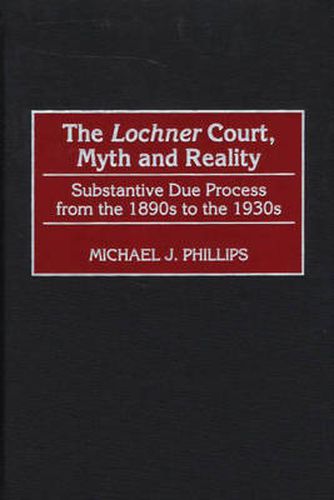Readings Newsletter
Become a Readings Member to make your shopping experience even easier.
Sign in or sign up for free!
You’re not far away from qualifying for FREE standard shipping within Australia
You’ve qualified for FREE standard shipping within Australia
The cart is loading…






Conventional wisdom holds that the Lochner Court illegitimately used the Constitution’s due process clauses to strike down Progressive legislation designed to protect the poor and powerless against big business. This book systematically examines all of the U.S. Supreme Court’s substantive due process cases from 1897 through 1937 and finds that they do not support long-held beliefs about the Lochner Court. The Court was more Progressive than commonly imagined, striking down far fewer laws on substantive due process grounds than is generally believed. The laws it overturned were not invariably social legislation, and relatively few due process cases involved freedom of contract. Moreover, Holmes, despite his reputation as a Great Dissenter, joined many of the cases striking down government action.
The book attacks three familiar normative criticisms of the Lochner Court. It accerts that (1) the Court’s substantive due process decisions almost certainly were not motivated by a conscious desire to assist business by suppressing social legislation; only sometimes did the justices’ nostalgia for laissez-faire lead to this result; (2) the conservative justices’ understanding of business and government often exceeded that found in the typical Brandeis Brief; and (3) most applications of Lochner-era substantive due process cannot readily be described as illegitimate assertions of judicial power lacking justification in the due process clauses.
$9.00 standard shipping within Australia
FREE standard shipping within Australia for orders over $100.00
Express & International shipping calculated at checkout
Conventional wisdom holds that the Lochner Court illegitimately used the Constitution’s due process clauses to strike down Progressive legislation designed to protect the poor and powerless against big business. This book systematically examines all of the U.S. Supreme Court’s substantive due process cases from 1897 through 1937 and finds that they do not support long-held beliefs about the Lochner Court. The Court was more Progressive than commonly imagined, striking down far fewer laws on substantive due process grounds than is generally believed. The laws it overturned were not invariably social legislation, and relatively few due process cases involved freedom of contract. Moreover, Holmes, despite his reputation as a Great Dissenter, joined many of the cases striking down government action.
The book attacks three familiar normative criticisms of the Lochner Court. It accerts that (1) the Court’s substantive due process decisions almost certainly were not motivated by a conscious desire to assist business by suppressing social legislation; only sometimes did the justices’ nostalgia for laissez-faire lead to this result; (2) the conservative justices’ understanding of business and government often exceeded that found in the typical Brandeis Brief; and (3) most applications of Lochner-era substantive due process cannot readily be described as illegitimate assertions of judicial power lacking justification in the due process clauses.